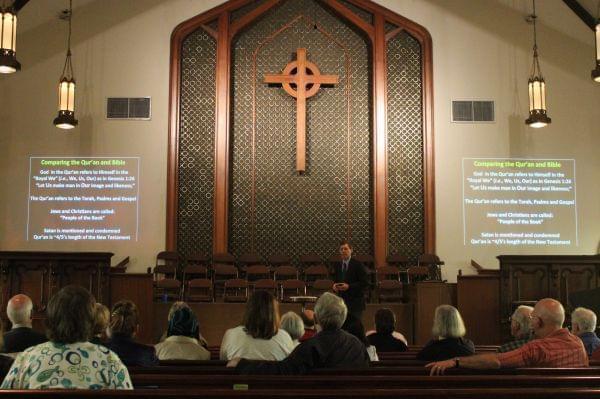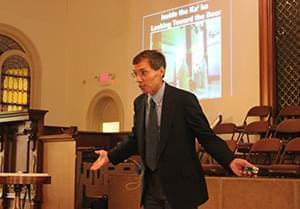Interfaith Class Seeks Deeper Understanding of Islam

Michael Chrzastowski teaches his first class in his series, Gaining a Christian Understanding of the Qur’an, at entered First Presbyterian Church in Champaign, IL. WILL/Amanda Honigfort
On a Tuesday night last summer, members of the congregation and community members entered First Presbyterian Church to attend a class on Islam taught by a Lutheran. This interfaith event was part of series of classes that Michael Chrzastowski created called Gaining a Christian Understanding of the Qur’an.
Chrzastowski worked for years as a geologist at the University of Illinois. Instead of retirement, however, he decided to pursue a second career in religion. He began taking classes at Parkland and the University of Illinois. One of those classes was in Islam and it made him realize how little he knew about the religion.

Michael Chrzastowski teaches his first class in his series, Gaining a Christian Understanding of the Qur’an, at entered First Presbyterian Church in Champaign, IL.
As he took more courses, he developed a deep appreciation of the religion and pursued a graduate degree in Islamic studies as he began to develop the curriculum he uses now.
Chrzastowski developed the program with the help of Dr. Mohammad Kahlil – and has presented at over 6 Christian churches thus far – all of different denominations.
My goal is to educate and to take away the mystery and maybe even the fear of the Qu’ran,” said Chrzastowski. “One of the things a pastor said to his congregation is we have a commandment – thou shalt not bear false witness. And then what he said was that we can have our opinion about Islam and Muslims and that’s fine – you can have your opinion – but you do really need to know the facts. And so that’s why he endorsed this class in his congregation.”
Fauzia Rahman has encountered some of the misconceptions Chrzastowski hopes to eliminate as she pursues her PhD at the U of I.
“Because I do wear hijab, meaning I cover my head, when something happens overseas there is definitely a lot of questioning,” said Rahman. “We’re quick to blame an entire group.”
But I think that sometimes as an American Muslim we’re stretched way too thin. We’re expected to speak on behalf of these very complicated complex geo-political situations. Fauzia Rahman
Rahman is often asked where she learned English and says people do not expect her to speak up in class.
“When you speak up people kind of look like ‘Oh! She’s talking’ ‘Oh, you’re doing your PhD? Wow! Is that ok with your husband?’ It has nothing to with my husband. It has to do with me,” said Rahman.
Rahman says some of the questions and the perceptions of Islam she encounters in this country make her afraid for her son.
“I think most Muslim parents are worried for their kids,” said Rahman. “We still have an issue with American identity and who’s accepted and who falls. I was born and raised here in America and I went through that as well in school – constantly trying to prove that I’m American – it is part of who I am. I am also Pakistani – my parents are from Pakistan, I visit a lot – there are these multiple identities.”
Sarah Laufenburg was one of the stdents in Chrzastowski’s class. She said that after the first session she already felt she had a better understanding of Islam. That goal of understanding and learning is one both Laufenburg and Chrzastowski share, and one Rahman and her husband appreciate.
